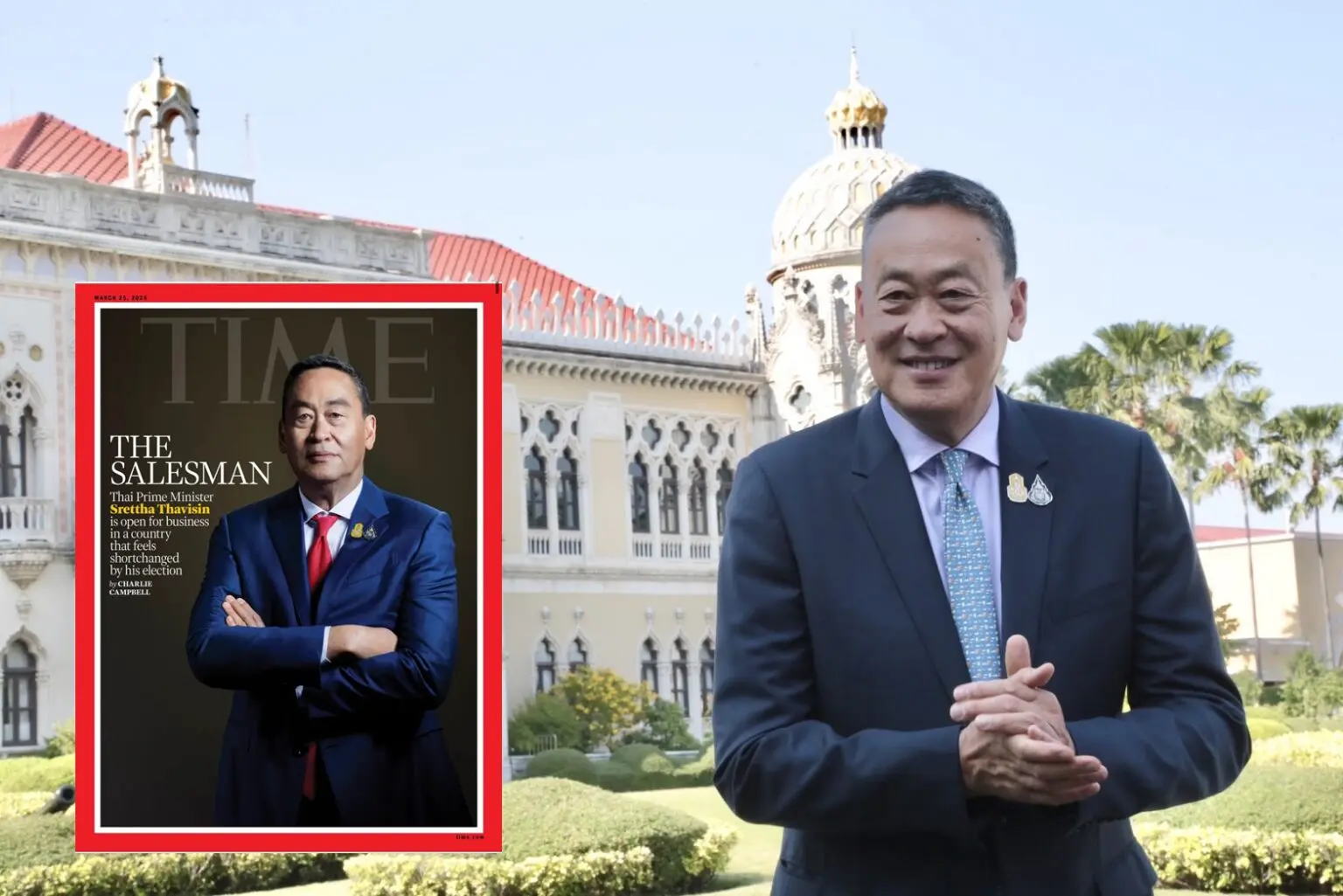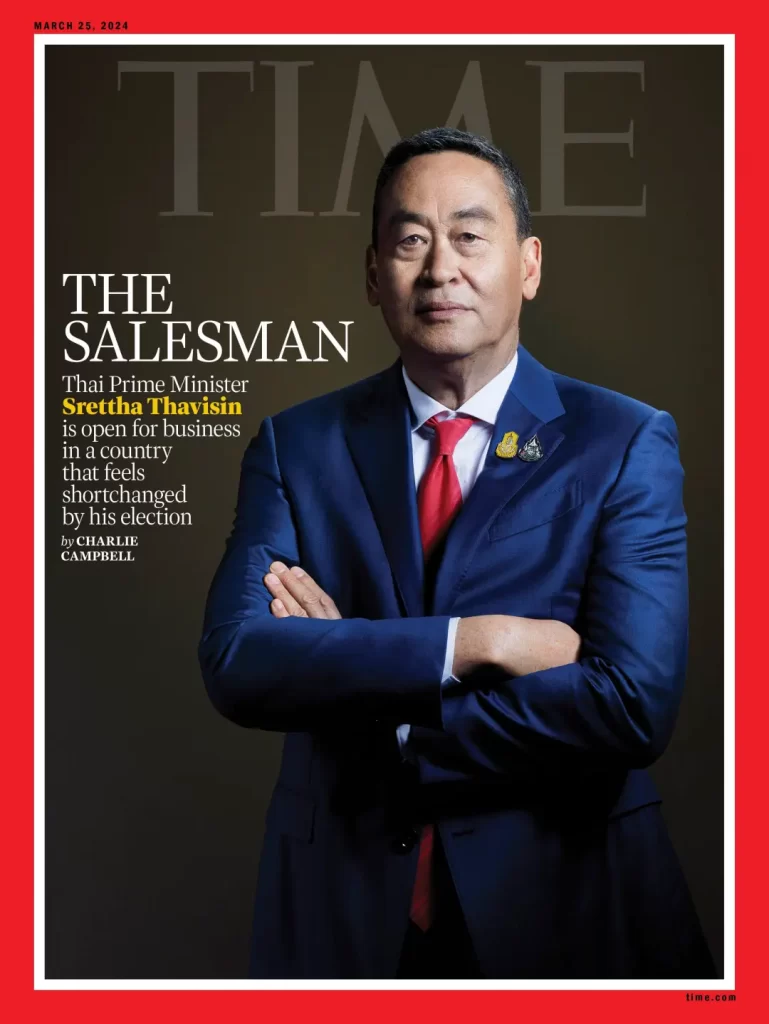News
Time Magazine Highlights Thai Prime Minister Srettha Thavisin’s Vision

Time Magazine recently featured Thai Prime Minister Srettha Thavisin. The article highlights his progressive policies and vision for the country’s future. Thavisin’s leadership style resonates with the younger generation, pushing for innovative solutions to current challenges.
Time Magazine’s coverage sheds light on his efforts to modernize Thailand’s economy and infrastructure. Thavisin’s pragmatic approach and commitment to inclusivity have garnered local and international attention.
Srettha, 62, a former property mogul who took office in September, is outspoken. He has travelled to more than ten foreign countries to court investors, including China, Japan, the United States, and the World Economic Forum in Davos, Switzerland.
The modest meeting room where he meets with TIME is surrounded by whiteboards with handwritten policy goals: digital wallets, national aviation hubs, potash mining, and Tesla.
His efforts are already bearing fruit: foreign direct investment (FDI) in the fourth quarter of last year increased by double compared to the previous year. In November alone, he announced investments in Thailand totalling $8.3 billion from Amazon Web Services, Google, and Microsoft. He continues, with a salesman’s avuncular charm, “I want to tell the world that Thailand is open for business again.”
For the past two decades, the self-proclaimed Land of Smiles has been plagued by bitter political schisms, prompting the Thai military to seize power in a 2014 coup and rewrite the constitution to ensure a leading role for the country’s armed forces. (Srettha replaced the commander who staged the coup.)
However, over the subsequent decade of bungling quasi-military control, Thailand’s economy, Southeast Asia’s second-largest, stalled, and inequality rose. According to the Credit Suisse Global Wealth Databook, Thailand’s richest 1% had 66.9% of the country’s wealth in 2018. (In the United States, it is approximately 26.5%.)
Hundreds of young people have taken to the streets during the last four years to demand that the military and the royal palace stop interfering with the democratic process. They flash the three-finger Hunger Games gesture to protest the democratic vacuum and fiscal mismanagement.
Thailand’s average GDP growth has been less than 2% over the last decade, while neighbours such as the Philippines, Indonesia, and Vietnam have grown at double to triple the rate and eaten Thailand’s lunch in terms of FDI.
To make matters worse, the pandemic destroyed Thailand’s key tourism industry, with foreign arrivals remaining at only 70% of their 2019 peak. “Thailand has been a real laggard in terms of recovery from the pandemic,” says Gareth Leather, Capital Economics’ senior Asia economist. “It’s worse than pretty much anywhere else in Asia.”
Srettha is clear about the stakes. He claims that Thailand is in an “economic crisis,” which must be addressed head-on. He’s already reduced fuel charges, announced a three-year debt moratorium for struggling farmers, and promises to launch a digital wallet scheme that will give every Thai adult 10,000 baht ($280) to encourage consumption. He has waived visas for visitors from China and India, intending to expand to several other nations.
Aside from tourism, Srettha hopes to strengthen Thailand’s position as a logistics, healthcare, and financial hub. He’s also working to raise Thailand’s prominence in the global arena, inviting U.S. National Security Adviser Jake Sullivan and China’s top diplomat Wang Yi in January for delicate talks between the superpower competitors.
He hopes Thailand, America’s oldest ally in Asia with deep historical and cultural ties to China, can act as “a bridge” and “safe space” while improving its worldwide prestige. “I want to see Thailand shine.”
However, the route ahead remains extremely uncertain. Srettha’s Pheu Thai (For Thais) party finished second in May’s general election, trailing only the anti-establishment Move Forward Party, whose extreme agenda was bridging the nation’s generals, conglomerates, and royal palace.
Despite winning 151 out of 500 legislative seats, it could not take power by a military-appointed Senate. Pheu Thai then formed a loose alliance of ten royalist and establishment parties to secure Srettha the top job with Senate endorsement.
The contradiction is that Srettha attempts to improve Thailand’s economy while collaborating with the same forces that are dedicated to preventing serious reform. Given the catastrophic situation of the Thai economy and his difficult path to power, he is under great pressure to show genuine results—and quickly—not that Srettha prefers to frame things in such words.
Source: Time Magazine
Time Magazine’s Hero of Asia































